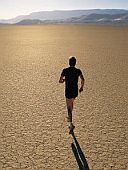What Are Cramps?
Cramps are unpleasant, painful sensations caused by contraction
or over-shortening of the muscles. They
affect almost 40% of marathon runners. A sudden cramping
will cause you stop suddenly as your leg muscle seems to curl
into a ball, with excruciating pain.
Not every runner however feels a sharp pain associated with the
muscle contraction. During a marathon your muscles can tighten
up gradually to the point where each step becomes extremely
painful. Continuing will only make this worse.
What Causes Cramps?
No one really understands what causes cramps. They are a medical
mystery although modern theories believe the reasons are
connected to the way nerve signals are sent to our muscles.
There are many theories about causes of cramps, ranging from
excessive heat, dehydration, and the loss of electrolytes and
minerals, to muscle fatigue, insufficient training, and poor
stretching habits. The latest theories focus on the interaction
between nerves and muscles. Although dehydration is often named
as a cause of cramps several studies have never shown
dehydration to be the cause.
One thing we do know is that the
tendency to get a cramp increases in the latter part of the
marathon. Reasons for this may be overexertion (such as running
the first half too fast) or low sodium and potassium levels in
the blood. Cramps may also be associated with higher lactic acid
levels in the cells, which occurs as we get into the higher
mileage.
Other factors for muscle cramps include age (older people are
more susceptible), number of years running and body weight.
Preventing Cramps
With all these different theories on dealing with cramps what
can we actually do to minimize the chances of cramping up during
the marathon?
Train appropriately - this
is especially important for marathoners. On race day, running
faster than you've trained for will overwork your muscles and
make them more susceptible to cramps.
Take time to stretch both
during your training and on race day. Pay close attention to the
muscles that are most likely to cramp up like your calfs,
hamstrings and quads. You should stretch those muscles gently
but thoroughly.
Eating foods high in potassium
can help prevent muscle cramps. Bananas are great sources of
potassium and are fairly easy to digest – eat them during the
week prior to the race.
Although
there is no scientific proof that electrolyte drinks
have any advantage over plain salt and water, you can still take
a drink of Gatorade. Take these
replacement and energy supplements before and during the
marathon. Of course you should take plenty of water during the
run as well. Even though there may be no correlation between
hydration level and cramps you don’t want to end up dehydrated!
Pace
appropriately – overuse of the muscles is a major
contributor to getting cramps. If you suffer regularly from
cramps try running your next marathon (or long run) at a slower
pace than you would normally. You might be pleasantly surprised
at the result! It is also important to adapt to the conditions
on race day, - if the weather is bad be prepared to make
adjustments to your pace.
|
|
|

Marathon Training For Beginners
For every runner who wants
to succeed at the
marathon distance - even
their first try!
Produced by certified trainer
Jago Holmes,
this ebook is
a 'must have' if
you are just getting started in marathon running.
Based on Jago's own experience as a successful marathoner and
trainer, his program is tailored specifically to the needs of the
beginner marathon runner. Jago is also
including as a free bonus
seven additional ebooks
on topics like Marathon
Nutrition, and
Injury Prevention.
Find
Out More Info Here |
|
The 100 Day Marathon Training Program
by Marius Bakken, Olympic Runner

“ I've found a faster, safer, and far easier
way, combined with my world-class training
methods to help hundreds of motivated
marathoners like you drastically slash their
personal best times, decrease their training injuries, and eliminate burnout.”
Find Out How Here!
**********************************************
|
|
|
Treating Cramps
If the worst happens and you do experience muscle cramps here
are some things you can do to alleviate the problem.
1. Stop running and stretch the affected muscles. You may have
to do this several times before the cramp finally dies down
2. Applying deep pressure to the affected muscle can provide
relief. Press into the sore muscle with your fingers for about
10 to 15 seconds at a time.
3. Drink a fluid with electrolytes like Gatorade and / or take a
salt tablet with water.
4. Slow down or walk for a period of time. You need to relieve
the stress on your muscles.






